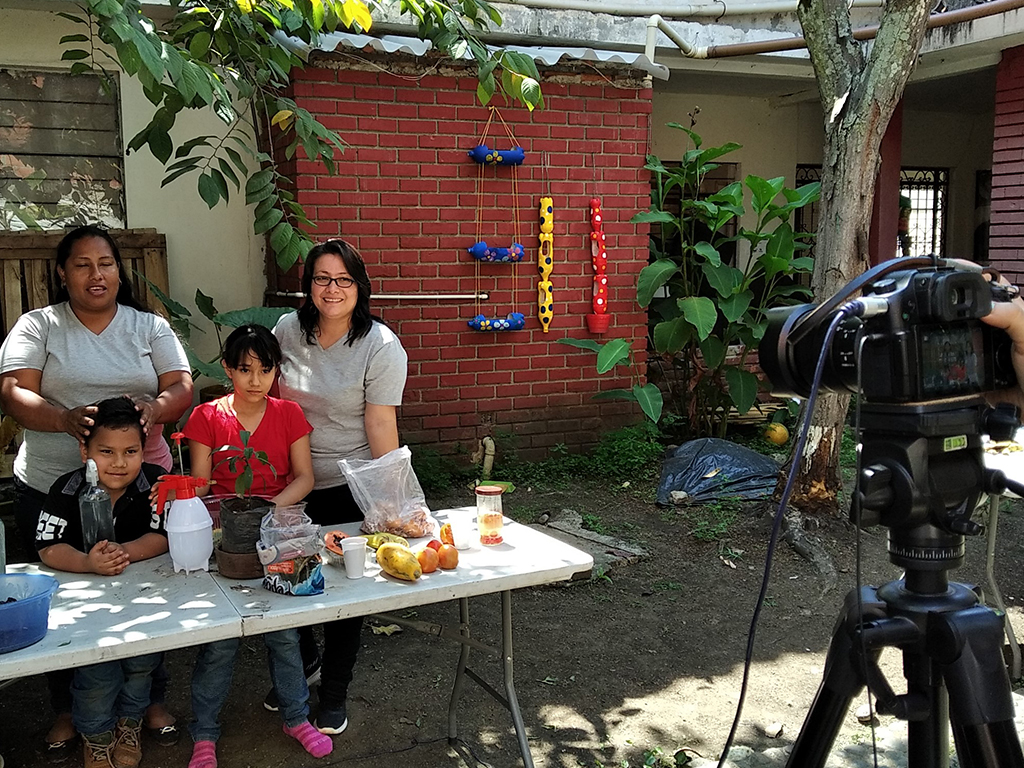Sharing a family tradition: Training neighbours in home gardening
by Adriana Patricia López-Valencia and Oswaldo López-Bernal. Universidad del Valle. Colombia
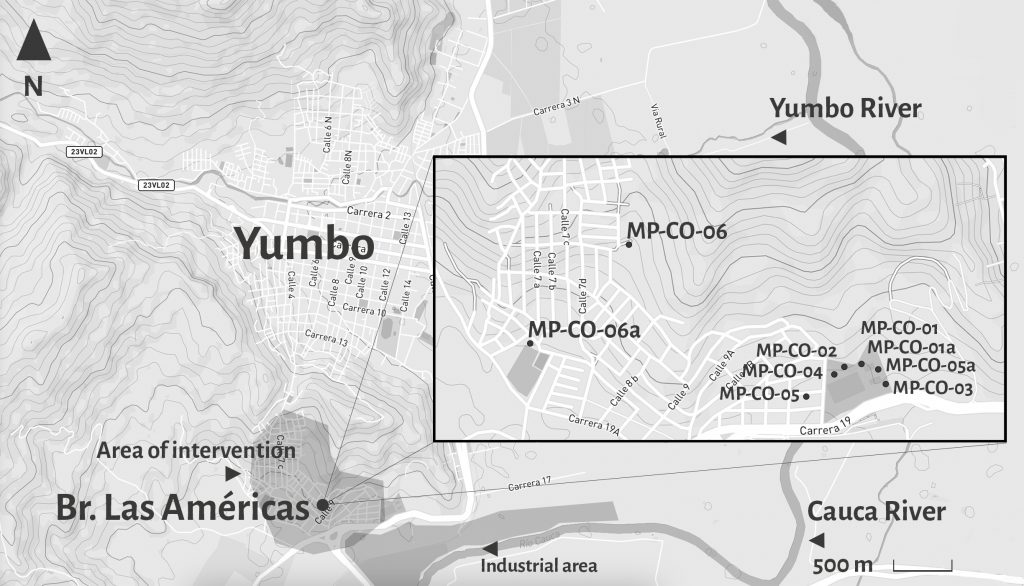
[table id=46 /]
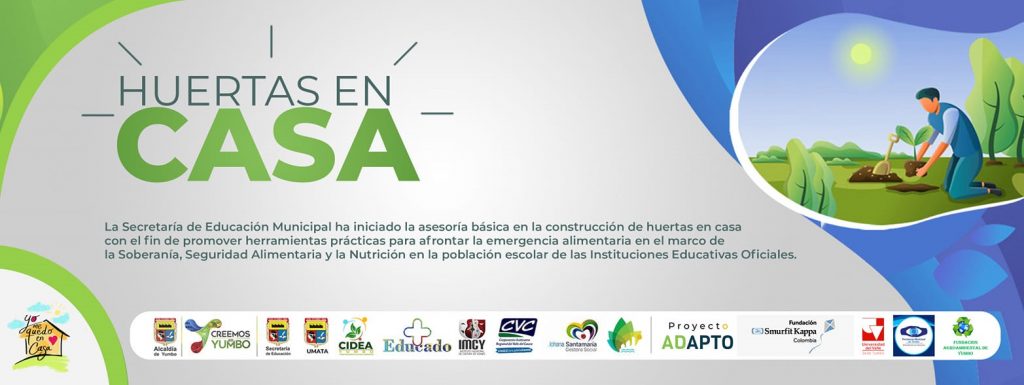
Fig. 2. Publicity for the “Huertas en casa” program, showing the participation of the ADAPTO project.
Summary
In the Las Américas neighbourhood in Yumbo, Colombia, sisters Claudia and Viviana share a passion for domestic recycling and reuse of materials that would otherwise end up in landfills. Over the years, they have transformed disposable materials into useful tools for domestic activities, including home gardening. In this local initiative, Claudia and Viviana shared their experience with their friends and neighbours through video tutorials, demonstrating how to create a home garden using leftover materials. These video tutorials contributed to the other gardening and reforestation initiatives funded by ADAPTO in Las Américas (see the “Reforesting Yumbo,” “Guabinitas creek reforesting,” and “Urban gardens” initiatives) by providing participants with adequate knowledge and skills. The training sessions, carried out online due to the pandemic, focused on home gardening techniques and tools, such as composting and irrigation. The participants later tested these techniques during in-person workshops with low-cost and recycled materials. Based on this experience, Claudia and Viviana scaled up the initiative to reach a larger audience. The main lessons from this initiative are: first, the exceptional agency of women in low-income neighbourhoods, who used technology to carry out activities during the pandemic; and second, the technical, financial, and logistical support needed for genuine bottom-up action.
Description
The initial objective of the initiative centered on reusing and transforming materials destined for landfills. The idea was to develop a communal recreational activity that would not only be good for the environment and useful for domestic activities, but would also contribute to generating stronger ties between neighbours — an important component of disaster risk reduction. Due to the pandemic and the high community interest in the home and communal gardening activities supported by ADAPTO, the leaders of the initiative, sisters Claudia and Viviana, decided to focus on the transformation of materials for gardening. They did so by sharing their experience with recycling materials at home through video tutorials and workshops. As participatory activities, these had the potential to improve interpersonal relationships among neighbours. Their initiative also benefited the other ADAPTO-funded initiatives. For example, the plants and trees that participants sowed at home, using Claudia and Viviana’s techniques, were later transplanted in El Poli Park as part of landslide risk reduction initiatives (see the “An urban vegetable garden” and “Sowing the first seeds” initiatives).
The initiative included a series of virtual and on-site activities. In 2020, despite the difficulties caused by the pandemic (reduced resources, restrictions on gatherings, illness, etc.), Claudia and Viviana organized virtual training sessions on various aspects of ecological home gardening (Fig. 6). Participants learned how to build bins and containers to separate the waste; adapt house spaces for home gardening; use recycling materials for the construction of vegetable gardens; build drip irrigation systems; create compost; seed; and adequately use natural fertilizers. In-person workshops later provided opportunities for participants to test the various techniques learned in the online training sessions (Fig. 5). Other video tutorials were also created and tailored for elementary school students. These videos have been used by teachers during the pandemic, with 125 children and their families benefiting from Claudia and Viviana’s instruction.
Based on that experience, Claudia and Viviana developed the second phase of the initiative: a training package (including audiovisual material) demonstrating how to create ecological home gardens tailored for low-income contexts. That training package can be used by community leaders or organizations to improve or implement ecological home gardening practices. This part of the initiative received logistical and communication support from the Secretary of Education, the Interinstitutional Committee for Environmental Education (CIDEA) of the Yumbo mayor’s office, and the Ushui Unguma Foundation.
Local Implementation and Evolution

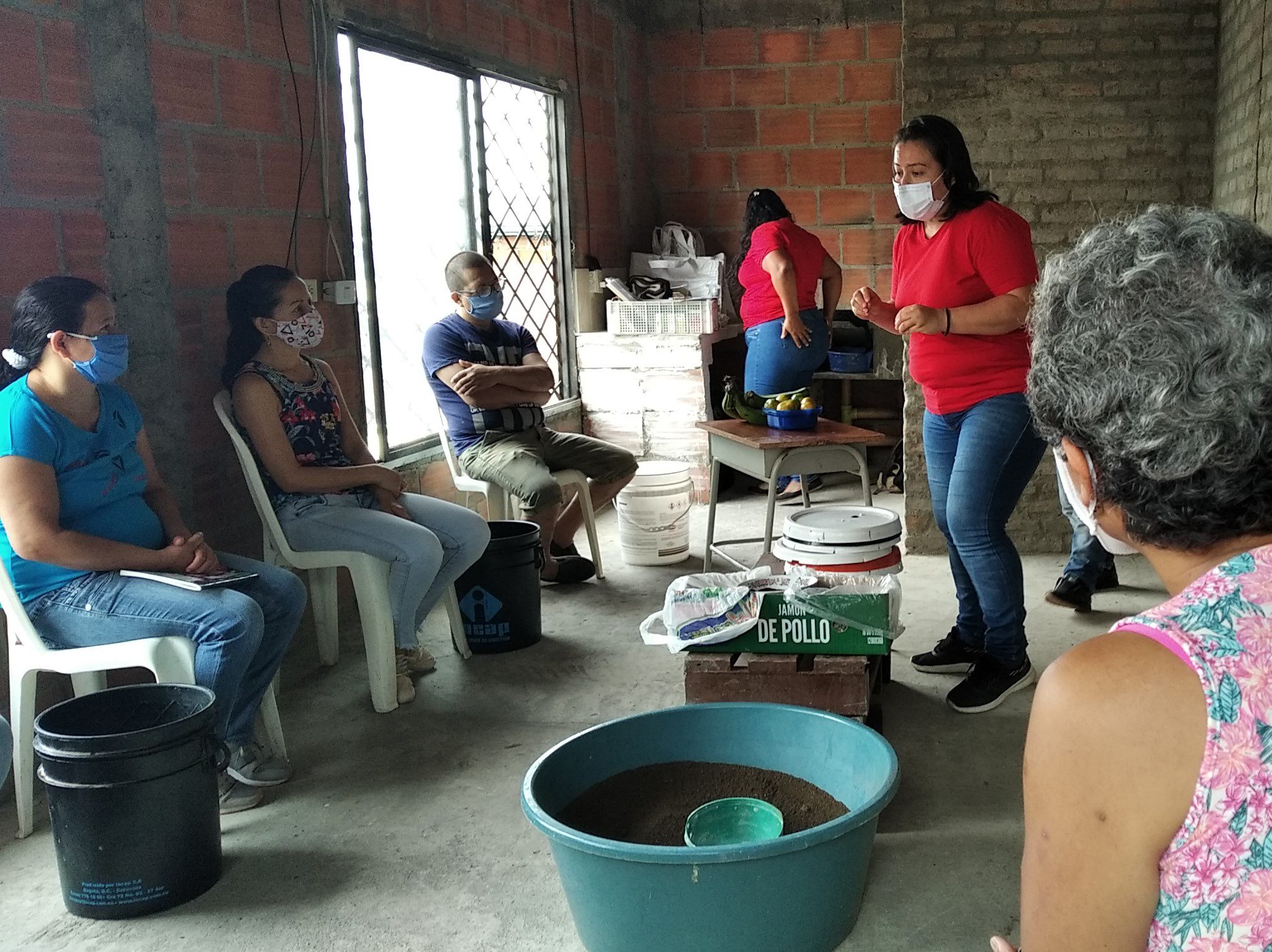
The lockdown measures implemented due to the COVID-19 pandemic forced the team leaders to adapt the initiative into home recycling and gardening activities (stage 7, Fig. 6). The training sessions were moved to a virtual format, so that the activities could continue despite the public health restrictions. Moving training sessions online was not easy: access to internet connectivity is minimal for students in Colombia, even in urban areas, and maintaining interest was challenging in the online format. However, the change of format made it possible to reach a larger audience: many citizens of Commune 1 and other nearby neighbourhoods were able to join the training sessions.
The leaders of the initiative then looked for new actors to get logistical and communication support, with a view to ensuring continuity and impact beyond the timeframe of the ADAPTO research project. The Secretary of Education, the Interinstitutional Committee for Environmental Education (CIDEA), and the Ushui Unguma Foundation joined the project, providing the equipment and virtual platform necessary to reach a larger audience in different educational scenarios (Fig. 6). After training sessions on video presentations, Claudia and Viviana produced seven video tutorials. The editing of the videos was completed in January 2021 and will be released soon.
Stakeholder participation
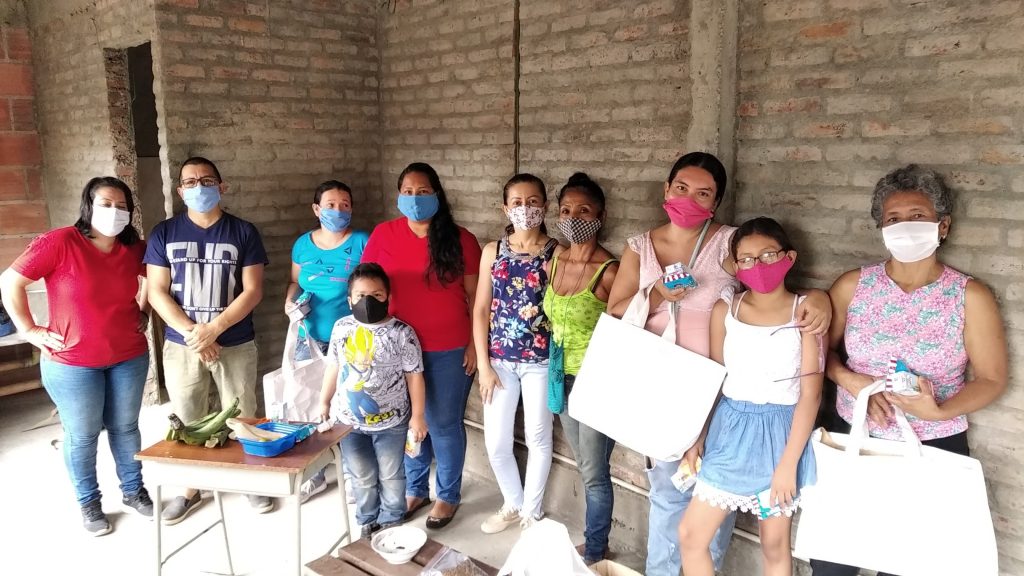
The leaders of the initiative, Claudia and Viviana, are two sisters and single mothers, with a longstanding interest in recycling materials at home. They are active in their community, and used the opportunity provided by ADAPTO to share their experience with fellow community members.
It is important to highlight women’s fundamental participation in the initiative. During the lockdown, women were the ones who bore the burden of household chores, as well as childcare and education tasks, since schools were closed. Because women were involved in the decision-making about this initiative, the activities could be inserted in domestic daily routines in ways that supported existing tasks, helped connect families, alleviated basic food needs, etc. They also decided that the workshops could later be carried out in-person in small groups.
Many organizations contributed to the initiative. The Yumbo Business Alliance contributed financial resources, supplies, and logistical support for some of the workshops as well as for the recreational activities that were organized to generate interest in the initiative. The Facy Foundation, an organization with experience in building and maintaining community gardens, and the Community Action Board of Las Américas have provided guidance during the activities. As local organizations with strong roots in the neighbourhood, they also helped gather participants for the various activities.
Moreover, they were able to tap into existing opportunities and solve challenges as they arose. CIDEA supported the production of video tutorials, and the Ushui Unguma Foundation provided the technological spaces and resources. The ADAPTO team from Universidad del Valle provided technical advice and financial support.
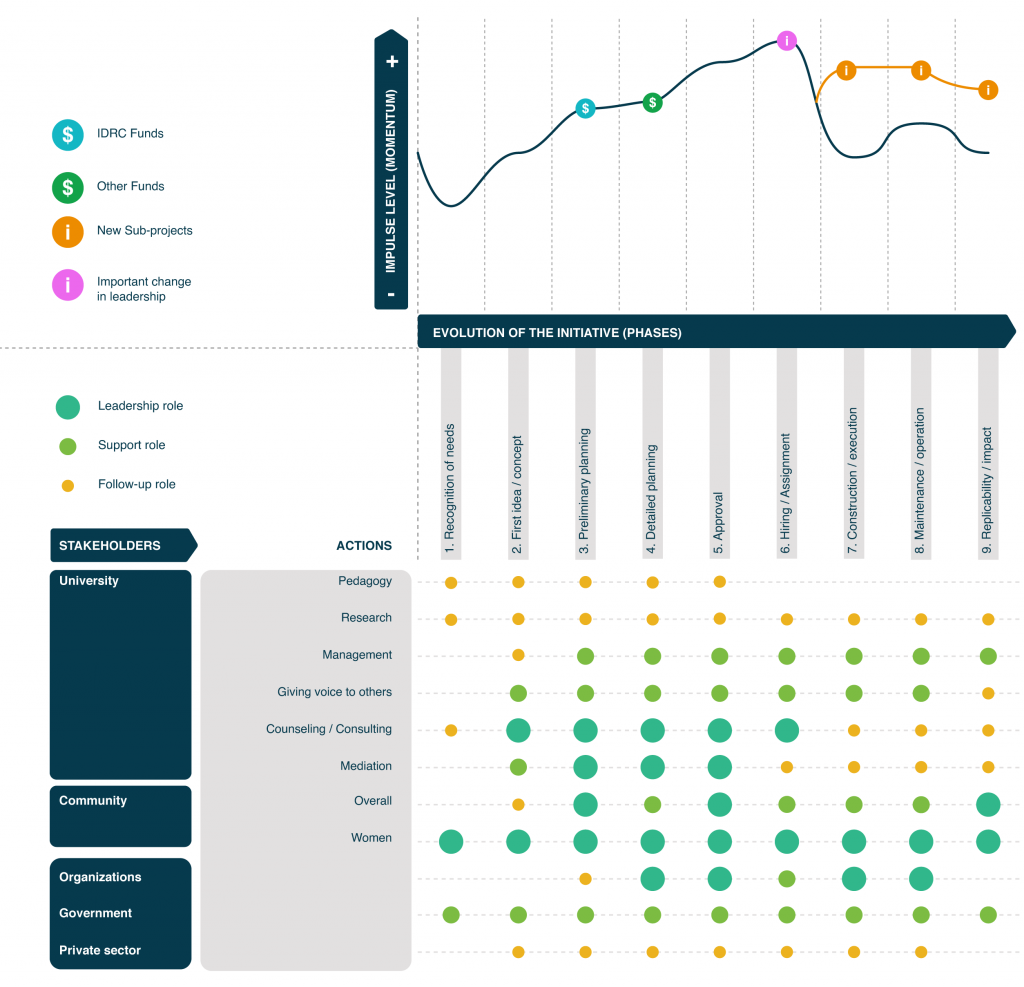
Results
- Organized 7 virtual training sessions on how to build bins and containers to separate waste, adapt home spaces for home gardening, use recycling materials for the construction of vegetable gardens, build drip irrigation systems, create compost, seed, and use natural fertilizers. A total of 245 residents from Commune 1 in Yumbo participated.
- Organized several workshops to practice the techniques explored in the training sessions.
- Developed a pedagogical framework and materials adapted for low-income contexts for training sessions on ecological home gardens.
- Produced 7 video tutorials on the topics of the previous training sessions, destined to a larger audience.
- Collected supplies and designs for the initiative, in collaboration with the ADAPTO team of Universidad del Valle.
- Adapted the protocols to continue the original activities of the project.
Lessons learned
One of the lessons learned has been the extraordinary ability of the community’s women leaders to adapt to the challenges brought on by the COVID-19 pandemic. Virtual resources were essential to the continuity of activities during the lockdown phase, but it was not as easy or natural to do as it could be in a high-income neighbourhood or with people who are accustomed to using technology at work. The leaders are single mothers, and like many of their neighbours, they have very limited resources to implement and record their online sessions and tutorials. Here, the support from the ADAPTO team and the other organizations involved was crucial, particularly to get through the pandemic period and meet the project objectives. Despite their precarious situation, they managed to tap into the potential of audiovisual media to disseminate information and conduct the training sessions. As such, this collaborative approach — where bottom-up action is supported by institutions and organizations — has high potential for climate change action in low-income settings.
Future actions and replicability
The two women leaders will consolidate the home-based activities and transfer them to the public spaces of Las Américas as well as “La Laguna de los Patos”. The replicability of this initiative depends on the expansion of the training process, both within and outside of the municipality. In turn, such expansion depends on the support of other sectors and agencies at the departmental level.


